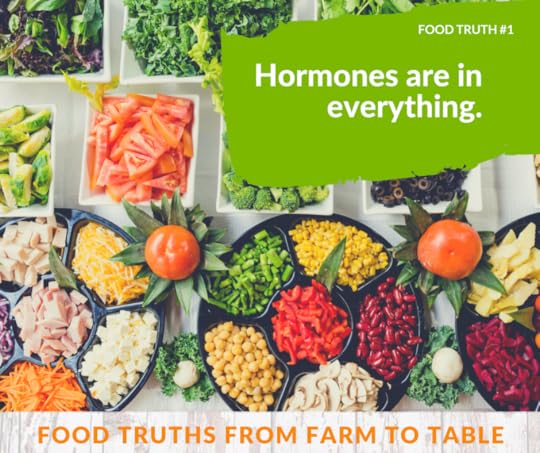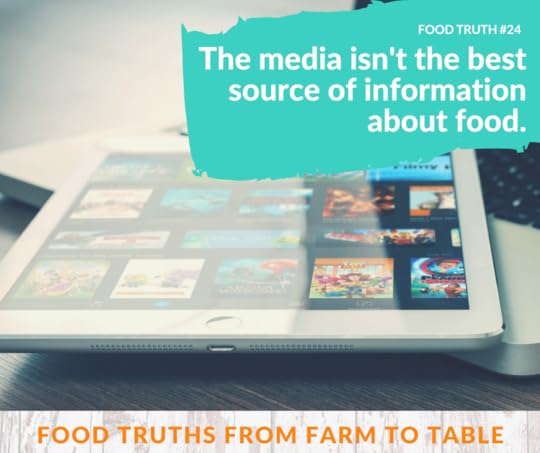Michele Payn's Blog, page 11
October 15, 2019
How do moms overcome food bullying at school, at the gym, and in their own head?
Mom and fitness instructor Ellen Frost explains how food myths make the grocery store confusing, the pressures of mom guilt & food shaming and how kids are bullied about food. Ellen joins Michele and Eliz to continue with the conversation about food bullying, bringing a “normal person” perspective about food. Ellen Frost is a stay-at-home mom of four and recently started teaching fitness classes at a small local gym. She is also an avid volunteer for school activities with her children. Ellen questions some food myths that people dearly hold to, yet they have no facts attached to them. For instance, who says the organic cage free eggs are truly better than the Kroger brand?
 Key points:
Key points:
Common food myths
Why do people buy brands?
How kids are bullied about food at lunch
Pressures of mom guilt and food shaming
The conversation:
(00:42): Ellen’s introduction
(01:20): Facts on agriculture
(03:31): Conflicting facts between the food truths and the myths
(05:33): Are organic cage free eggs better than the Kroger brand?
(08:30): Food bullying among teenagers
(09:46): How people buy fancy labels thinking they are the best
(10:38): Marketer’s tricks
(12:32): Are whole food products better than the rest?
(16:58): Consult a registered dietitian for nutritional advice
(17:30): Have you watched any documentary on food production?
(22:18): Why do we love conflating opinion with fact on a regular basis and instead of questioning the source of the information?
(24:26): We should always consult farmers before making conclusions on food
Fabulous Quotes
“Food should be about celebration, not condemnation.”
“Consult a farmer who knows how your food is produced before you just assume cage free eggs are better.”
“If you actually want nutrition advice, you should talk to a registered dietitian.”
“Just because it doesn’t have the fancy labels and names doesn’t mean that a certain food isn’t good.”
October 10, 2019
Are Confined Spaces Cruel?
 Housing is used to protect animals-and your food-from nature
Housing is used to protect animals-and your food-from natureThere are many ways to house dairy cattle. Some operations will keep their cows out on
pasture, like my neighbors, so the cows aren’t in the barn a lot during the
summer and fall. However, even those cows are in the barn for shelter during
weather, to eat their specially mixed ration (a nutritionally balanced feed
mix) and to get milked.
“Dairy
cows being abused” is an increasingly common headline. It’s important to
remember context, which is tough to do if you have not been on a dairy farm.
For example you may find it disgusting to sleep in a bed of sand, but cows love
it. What
may be cruel for your dog is not necessarily so for a cow.
Since cows wear their leather coats every day,
they can handle a lot of cold, but protecting their udders is a priority. It’s
important in the cold is a priority to dairy farmers who live in harsh winters.
Those who live in a more arid area are concerned with keeping the udders clean
during times of high rain, when it’s muddy.
Shelter for milking cows is really important
because their teats (each cow has an udder with four teats hanging down) can
get frostbitten or damaged in the mud. Frostbitten teats can be permanently
damaged, leading to more mastitis (an infection which is hard on the cow and
expensive to treat). Mastitis is most
commonly treated with antibiotics, but the milk is withheld, so it does not
enter the food supply.
Likewise, providing shade for cattle not housed
in barns in extreme heat is important. Dairies will have shades so that their
cattle can better handle the heat. Clean
drinking water is always important, but especially critical during periods of
high heat. Cows are also monitored for panting; many dairies have overhead
sprinklers to keep their cattle cooler.
Some dairy farmers put cattle out on pasture a
good part of the year. New Zealand is known for that because of their climate,
but it’s also done in the U.S. These
operations require a lot of pasture management, have reduced feed costs and
typically a lower milk production. And most farms today have a metal barn with
closed doors – not to hide anything, but to protect their animals biosecurity.
These metal barns, while not as pretty as the old wooden barns of yesteryear,
are a significant improvement in cow comfort and biosecurity because animals
are protected from the elements and diseases from other species.
The view from my office is Holsteins out on
grass. It is beautiful, but there are different ways to keep cows happy in
both confined spaces and green places. Why does a dairy farmer choose one
way over the other? They choose what works for their family, cattle and
resources. The critical factor is being sure the cows are managed well, which
includes keeping a close on cow comfort, health, nutrition, etc. from the time
they are babies.
The good news for you is that the milk in the
store is the same quality of milk whether it’s from a small operation milking
80 cows in a pasture using robots or a large family farm with 5,000 cows milked
in a rotary parlor.
Read more at
Food Truths from Farm to Table
to arm yourself with 25
truths you urgently need to know about food so you can shop without guilt,
confusion, or judgment. A new book,
Food Bullying
, releases November 5 to upend the way you think about eating
choices.
October 8, 2019
How can a farmer grow organic & GMO food on thousands of acres?
If you’re a person who always wanted to know more about the behind-the-scenes work that happens at the farms that produce your food, this episode will open your eyes.
In our conversation, we cover:
What does “a sustainable farm” look like?
Why Ryan decided to farm organically
The potential and pitfalls of a farm going organic
The “behind the scenes” work and knowledge that goes into running a farm
Organic vs. Conventional vs. GMO farming and why all choices are right
Food bullying in agriculture
Food label fibs e.g. popcorn is not a GMO
The Conversation:
[3:19] What do you grow on your farm?
[4:52] What is a transitional crop?
[7:32] Why did you decide to go to organic?
[12:32] Is organic the only way to go?
[13:37] Are GMO’s wrong?
[16:25] All the technology and science that goes into running a farm
[19:32] Dealing with criticism as an organic farmer
[25:00] 3 quick tips for overcoming bullying
Fabulous Guest Quotes
“The hardest thing about organic is insurance…”
“I think the industry has made a mistake in using GMOs as the “easy” button.”
“Organic takes a lot of labor, a lot of work, and a lot of time…”
“One thing the American farmer is really good at is taking a market…”
Links to Check Out
Weeks Family Farm on Instagram
Sustainable Seed Solutions website
Food Bullying: How to Avoid Buying BS by Michele Payn
October 3, 2019
What is the food bullying epidemic?

How have you been made to feel about food? Has anyone ever made you feel bad about the food you choose to eat? Is it OK to shame people about their eating choices if it’s not socially acceptable to shame people on race, religion, or sexual orientation? Why is a pregnant woman made to feel guilty if she’s not buying the “right” label of food, or a new dad totally frustrated over the thousands of options found in the grocery store? Is it necessary for a college student to be shamed over her choice to eat meat or not?
B.S. refers to the bad behaviors, deceptive label claims, marketing half-truths, and other unnecessary drama surrounding our food plates today. Frankly, it’s all just Bull Speak (B.S.). An $8 gallon of milk from a specialty store is not superior to a $1.99 gallon of milk from a convenience store. Both the perceived better label and resulting sense of superiority are often B.S. Assuming you are a better person because you bought the “right label” of food is no different than schoolyard bullying over the “right brand” of clothing.
Bullying operates from a point of privilege, preying on
fear. Food marketing is often fear-based. This misleading marketing has made
food overly emotional, to the point where our nutrition is seemingly trumped by
moral statement. The resulting social movement has caused an alarming rise in
food bullying. The more food bullying, the more B.S. food—and so the cycle
continues.
Consider this; if the power in your food choices has shifted to what you read on marketing labels, you are likely being bullied. The front of food packages frequently contains misleading and B.S. information—because companies want you to spend your money on their product. The Michigan State University (MSU) Food Literacy 2018 study showed that 87% of people are at least somewhat influenced by food labels in their food buying decisions. Do label claims influence your eating choices? Likely.
Merriam Webster defines bullying as “acts of written or
spoken words intended to intimidate or harass a person.” Bullying is a huge
concern with young people today; I know from personal experience how painful it
is, after being bullied as a seventh-grade girl in a new school system. Taunts
from decades past are still a clear and painful memory.
The National Bullying Prevention Center clarifies the difference between bullying and conflict, which is a disagreement or argument in which both sides share their views. Conflict is an exchange, such as a debate about whether green or white grapes are better. Bullying is done with a goal to hurt, harm, or humiliate. It’s often about having power and control over another. The power, real or otherwise, can include a group against an individual, one person being physically larger than another, or elevated social status. That power, particularly elevated social status, has resulted in an epidemic of food bullies.
What does food bullying mean?

Bullying doesn’t happen without fear—and there’s a whole lot of fear in food today! Food bullying literally takes food out of someone’s hand—by removing choice, creating emotion, or forcing an individual into groupthink mentality. I’m so excited for the new Food Bullying book to release on November 5 and shed light on this epidemic that has made eating far too emotional. You can also take a deeper dive with the new Food Bullying Podcast, featuring dietitians, farmers, moms, neuroscientists, and other experts who bring context to food bullying. How will you elevate the food conversation?
September 30, 2019
How do you overcome guilt when buying groceries?
In this episode, Michele and Eliz talk with retail dietitian Leah McGrath about developing a healthy relationship with food, whether we are in the supermarket or posting on Instagram.
Key points:
Figuring out what nutritional information you should listen to–and which information you should ignoreIs the “Dirty Dozen” really as dirty as we think it is?Does organic always mean “pesticide-free”?Why you should have a personal standard when it comes to your foodWhy you shouldn’t focus on the front of the food packageHow are manufacturers trying to make food labels more reader-friendly?
The Conversation:
[2:44] What the heck is a retail dietitian?
[5:25] What confusion do you see with people have around buying the right food?
[7:00] How do you decide with all of the confusing health information out there?
[9:00] The “Dirty Dozen” Food list
[15:11] Food bullying and social media
[19:00] Having your own personal standard with food
[22:34] How should you read a food label?
[27:40] 3 quick tips for a healthier relationship with food
Fabulous Guest Quotes
“I can see the relief across people’s face when you say ‘It’s OK to buy food based on price and how it looks..”
“Consumers are just overwhelmed with the volume of information…”
“People become very judgmental about what mothers are feeding their children…”
“…your best bet is to ignore everything on the front of the package because it’s like make-up on a pig.”
Links to Check Out
Build up Dietitians on Facebook
Build up Dietitians on Twitter
September 26, 2019
Is meat messing with your hormones?

When I was a teenager, I
drew comic cows. These cows often had big muscles – biceps like Olympic
athletes. I drew them because they were cute – and as a 5’5” female, I know how
strong cattle can be. Never in a million years did I consider that someday
people would think farm animals are “pumped up” on drugs.
I have since learned that apparently people think cows are on crazy
amounts steroids. That is NOT the case. It’s also not the case with chickens,
turkeys or pigs.
Yes, your bacon, burger, chicken wings, turkey breast and brats all have hormones. Hormones are in all food.
Henny Penny looked pretty normal to me when I read the classic book to my
child. I’ve since learned from other mothers that they are very concerned about
breast size. In the Henny Penny’s of the world, of course. There is a myth that
chickens and turkeys have big breasts because they’re on hormones. Both
chickens and turkeys are bred to grow larger breasts; it’s in the genetics (breeding
response to consumer demand). The use of growth hormone has not been approved
in raising chickens for 50 years. Same with turkeys. And pigs.
To be clear, no hormones are fed, injected, sprayed, sprinkled or otherwise given to swine or poultry. No chickens, turkeys, pigs, or Cornish game hens have added hormones – regardless of the label claim. There aren’t even any products manufactured to give to them.
Historically, USDA recognized the potential for consumer confusion with
product labeling. For example, some companies began requesting approval to
label chicken as “Hormone Free” and “No Added Hormones.” The USDA started
requiring these claims could not be used to market poultry unless the claim was
followed by the disclaimer “Federal regulations prohibit the use of hormones in
poultry.”
Will you ingest hormones if you eat turkey or chicken? Yes. Will you ingest hormones if you eat kale? Yes. Does your bacon include hormones? Yes. Hormones are the chemical messengers of life – all living things have hormones.
So do you. Your body produces estrogen each day. 513,000 monograms if
you’re a woman who’s not pregnant, only to be topped by 19,600,000 nanograms of
estrogen produced daily by a pregnant woman. Men, who only produce 136,000
nanograms of estrogen/day, should perhaps reserve comment about the impact of
estrogen on female temperament.
Not to get into anyone’s business, but consider birth control pills,
testosterone therapy and hormone therapy.
What hormone dosage are you ingesting?
As an example, let’s say a 170 pound woman on low dose birth control
takes about 0.48 milligrams of estrogen monthly (not to mention the
progesterone) for 21 of 28 days every month. If she – or anyone else on hormone
therapy – stops taking it, does the hormone stop working?
Yes, hormones stop working if you no longer take them. Hormones don’t pile up in your system; they
do not have a build-up effect that prevents pregnancy, causes cancer or turns
you into the Incredible Hulk. The same
is true in both humans and beef cattle.
Hormones don’t build up.
September 23, 2019
How are farm families stressed by food bullying?
In this episode, we approach farming from a different perspective and take a look at the impact of food bullying on mental health. Lesley Kelly, a farmer and mental health advocate, shines some insight into the pressures, decisions, and the unique calling of the farming lifestyle. She also discusses the rewarding, but difficult, role mothers have in trying to choose the right food for their children
In our conversation we cover:
The sad story of farmer’s mental health
Why farming is more than an occupation
How our words & purchases affect farmer
What’s up with canola?
The GMO question: from a farmer’s perspective
What’s up with bleached flour
Feeding our children the best we can
The Conversation:
[3:36] Do More Agriculture Foundation
[4:05] Farmers & mental health
[9:30] Farming & personal identity
[11:05] What is the impact of people criticizing the farming profession?
[13:24] The impact of your buying decisions on farmer
[13:56] Canola
[18:11] GMOs-Yay or Nay?
[23:30] Bleached flour
Fabulous Guest Quotes
“I really don’t see borders being defined when it comes to mental health and agriculture.”
“There is immense pressure to make your farm work.”
“Agriculture hasn’t really been encouraged to talk about mental health.”
“There’s something to be said about being a farmer. It’s such a rewarding career.”
“We can grow more crops now…more than we did 20 years or 10 years ago”
Links to Check Out
Do More Agriculture Foundation website
Do More Agriculture on Facebook
Do More Agriculture on Twitter
High Heels & Canola Fields website
High Heels & Canola Fields on Facebook
High Heels & Canola Fields on Twitter
Embrace Your Heart with Eliz Greene
Food Bullying: How to Avoid Buying BS by Michele Payn
September 19, 2019
Should you eat food you can’t pronounce?

Would you eat an egg with ‘amino acids,
phenylalanine, octadecenoic acid, sugars, colors E160c & E306, flavors phenylacetaldehyde
& acetone – also contains benzene
& sulfur’ on the ingredient label?
What about blueberries labeled with the
following ingredients: sugars made up of 48 percent fructose, fatty acids like
linoleic acid, flavors ethyl ethanoate & hydroxylinalool and colors E163a
& E163e?
Food elitists often promotes “Don’t eat what you
can’t pronounce.” I beg to differ – I love blueberries and keep them stocked in
both of my freezers. Eggs are nutritional powerhouse for my family. I may trip over my tongue while trying to
pronounce all of those ingredients, but why should a journalists or social
media be telling me what to eat?
As the Business Insider article featuring Kennedy noted, “Marketers often feed off consumer’s concerns that “man-made” chemicals are bad. But the fact is that all foods (and everything around us) are made up of chemicals, whether they occur in nature or are made in a lab.”
Science does not make for
sexy sound bites, but it’s a whole lot more reliable than a journalistic
opinion. Turn to science, not away.
Let’s get back to common sense and critical
thinking. Scientific
names can be scary. Chemical names can be scary unless you’ve taken high school
chemistry. In fact, food ingredients can be downright overwhelming. But media
claims should not negate the nutrition or value an ingredient or farming
practice brings to your food plate. Stand on science.
So what are you supposed to believe? My hope is that you’ll turn toward
farmers and ranchers if the question is about a particular practice in food
production. If a concern is about nutrition, find a registered dietitian who
should be making science-based recommendations versus their personal opinion.
If it’s about an additive or processing technique, look up a food scientist or
an authoritative (credentialed) food science book or organization webpage.
Find experts
who use science, and do not sensationalize. Focus first on the source,
considering who is presenting the information, what their credentials are, and
what their incentive is for presenting the information.
These are some of the most
common questions:
How is by food being produced? Ask a farmer; they can give you great detail about today’s farming, how practices are done and why. I have dietetic concerns, what should I be eating? Rely on a registered dietitian (RD), the Academy of Nutrition and Dietetics requires them to make science-based recommendations rather than on personal opinion about production style.What about the article I read citing science? Check the science, check the source, check for common sense. Critical thinking is your friend.
Read more at
Food Truths from Farm to Table
to arm yourself with 25
truths you urgently need to know about food so you can shop without guilt,
confusion, or judgment. A new book,
Food Bullying
, releases November 5 to upend the way you think about eating
choices.
September 16, 2019
How can a millennial move from fearing to celebrating food?
Breaking out of the fear cycle in making food choices can be difficult.
That’s why we turned to clinical dietitian, Danielle Penick, RDN, in this episode. Danielle has been through her own journey from an insecure food shopper that was easily bullied to becoming a comfortably cool food buyer who became a dietitian helping cancer patients. She also gives tips on how to engage in respectful food conversations, rather than food fights.
In our conversation, we cover:
What training does a dietitian (Registered Dietitian Nutritionist) have?
Is a dietitian and nutritionist the same thing?
Supplements, cleanses, and detoxes: Yay or nay?
The locavore dilemma
Busting food myths and a framework for providing food tips
The Conversation:
[5:04] What does a dietitian do?
[6:40] What does it take to be a dietitian?
[9:20] Is a dietitian and nutritionist the same thing?
[10:31] What are your thoughts about “experts” who call them “nutritionists”?
[13:17] What about cleanses and detoxes?
[14:49] What foods are toxic to our health?
[16:40] What personal standards do you have about food?
[17:37] The “local food” dilemma
[21:20] What helped you in your own personal journey with food?
[29:28] Busting food myths
[30:27] 3 quick tips to stop food bullying
Fabulous Guest Quotes
“…we do live in one of the safest times in human history in terms of food and agriculture.”
“For some people, I know I couldn’t change their mind, but I can at least plant the seed.”
“Very rarely do I see a dietetic internship having much emphasis on agriculture.”
“Any dietitian call themselves a nutritionist, but the opposite is not true.”
“Most supplements that are out there are just good marketing. They’re not well regulated.”
“Everything in life is toxic at the right dose.”
“…we know that eating more produce is better than not, regardless of the production method.”
Links to Check Out
Build Up Dietitians on Facebook
Food Bullying: How to Avoid Buying BS by Michele Payn
September 11, 2019
How is your brain being manipulated about food?
It’s very easy for us to ignore the fact that the brain controls a high percentage of how we view food. Our guest today is here to help us understand the neuroscience perspective on brain and food. Dr. Tyler Davis is an associate professor of psychological sciences at Texas Tech University, where he directs the Cap Rock Lab. The Cap Rock lab is something that uses functional in neuro imaging to study cognitive neuroscience in categories, categorization, attitudes, and preference.
Isn’t it amazing how our brains make decisions without asking for our permission? For instance, your brain can dislike a certain food without asking for your consent, based on things you have heard or seen.
Key points:
How our brain works when it comes to food
Neuroscience perspective on how brain processes information related to food
Brain reaction to GMOs and hormones, sustainability and antibiotics
How to overcome food bullying
The conversation:
02:44: Tyler Davis’ introduction
03:28: How our brain works
04:21: What part of our brain is used in processing uncertainty?
06:05: Neuro economic approach
13:30: All about GMOs and hormones
28:33: Tips to overcome food bullying
Fabulous Quotes
“Make sure that you’re not paying for a label unless you really want to.”
“Don’t think that something is risky just because you don’t know enough about it or because you’ve heard a lot of conflicting information.”
“Uncertainty feeds into our perceptions of risk and makes us see the food products potentially as riskier than they actually are.”
“Prefrontal cortex is where we make a lot of our decisions.”
Links to Check Out:
Tyler on twitter
Tyler’s email: h.davis@ttu.edu
Food Bullying: How to Avoid Buying BS by Michele Payn



